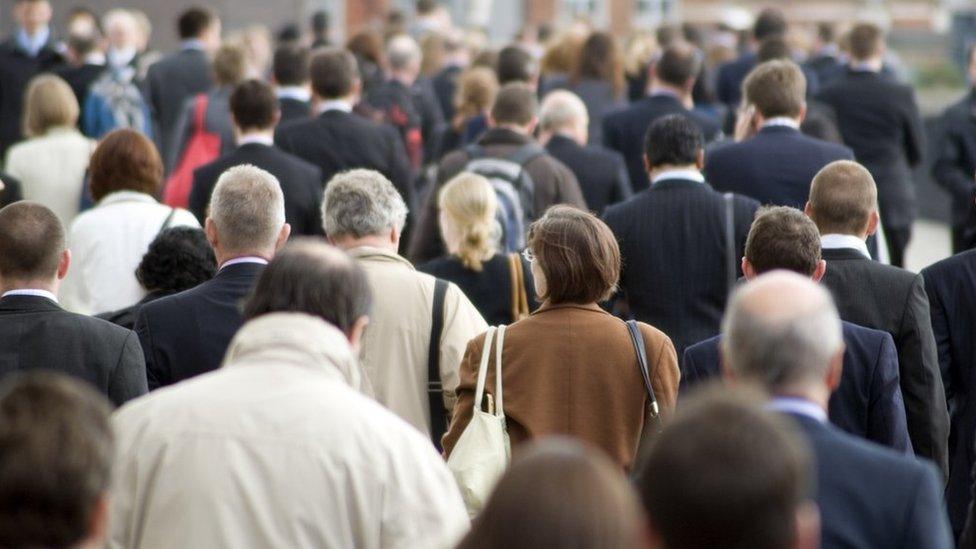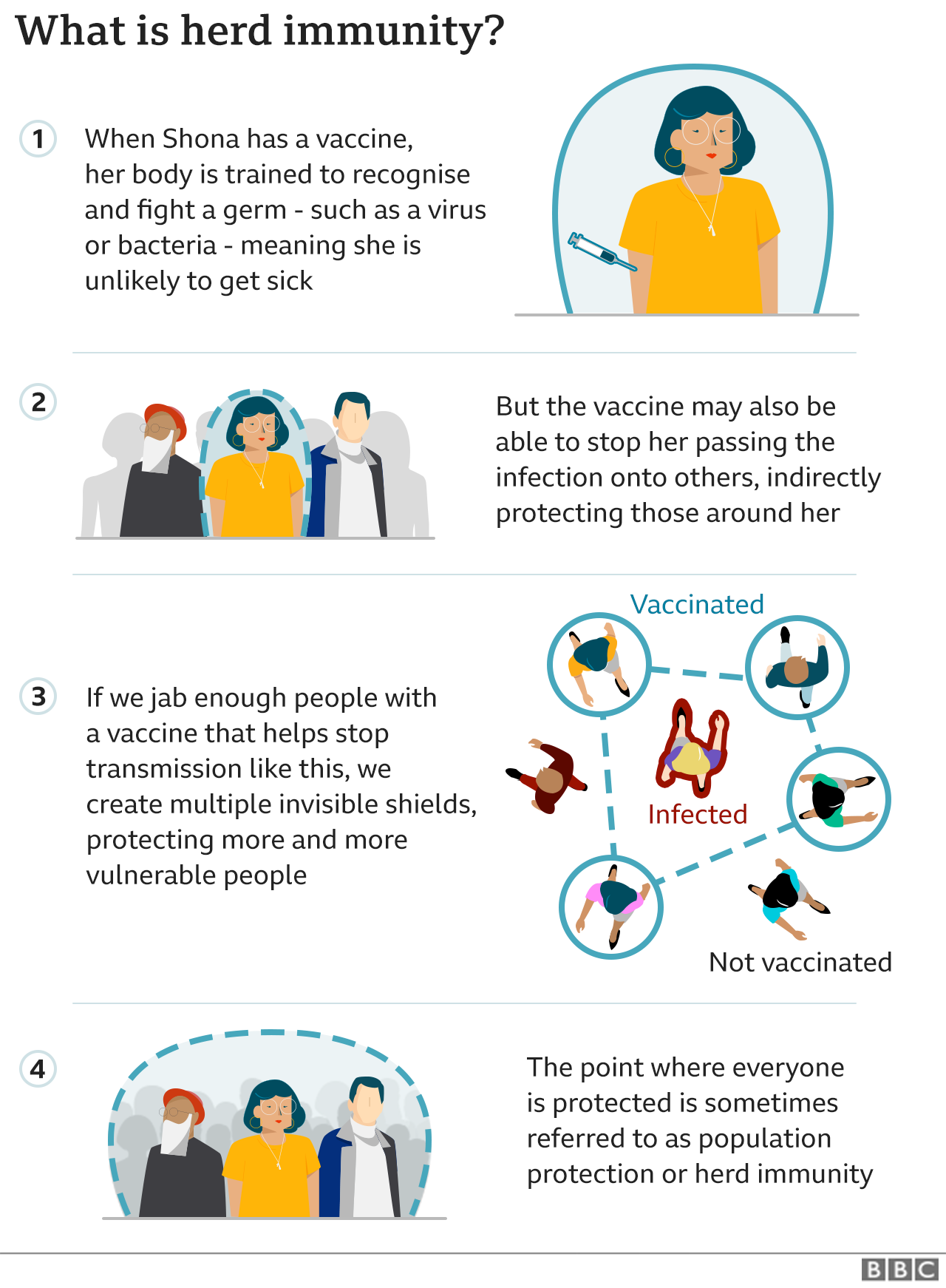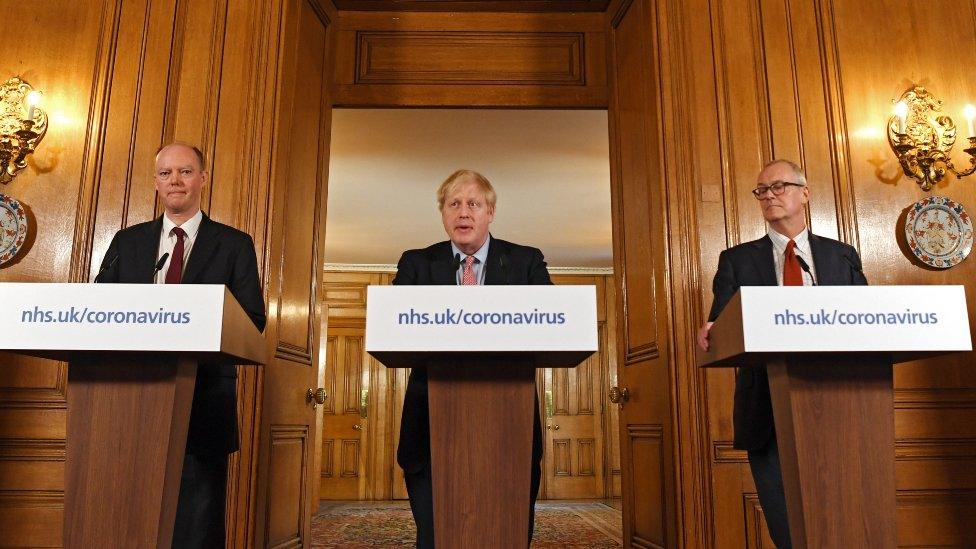Covid report: What is herd immunity?
- Published

The government's response to Covid-19, early in the pandemic, has been heavily criticised in a report by MPs.
It says the government initially sought to "manage, not suppress, infection". The report says, external this amounted to "herd immunity by infection", was the wrong policy and the first lockdown (announced on 23 March 2020) should have been brought in earlier to save lives.
What is herd immunity?
Herd immunity is a scientific term describing the point at which a population is protected from a disease, either by enough people being vaccinated or by people having developed antibodies by having the disease.
Take measles, for example. The World Health Organization (WHO) says herd immunity for measles is reached when 95% of a population is vaccinated - meaning the other 5% will be protected because vaccination is hampering its spread.
Experts in Israel had estimated herd immunity for Covid would be reached at 65%-70%, but this was before the more transmissible Delta variant took over.
The infection survey, external from the Office for National Statistics estimated that over 90% of the UK population had antibodies against Covid-19 in the week beginning 23 August 2021.

So why the controversy?
In March 2020, months before vaccines were available or even developed, herd immunity was a phrase being used by some politicians and scientists.
Early that month, they were talking about trying to avoid a peak in Covid-19 cases which could overwhelm the NHS while it was coping with the usual winter pressures - this was called "flattening the curve".
One policy option cited was to protect the most vulnerable and let others who were likely to suffer less severe symptoms catch the virus, build herd immunity and limit the need for lockdowns.
There was concern about the cost of lockdowns and restrictions, especially because without herd immunity the infections would just return as soon as they were eased.
This feeds into the question of whether the UK locked down too late, given what we already knew early in 2020 about the spread of the virus in places such as Italy. This question around timing will no doubt be considered by the public inquiry into the handling of the pandemic that will start in spring 2022.
What was said in public about herd immunity?
The person at the forefront of the public debate over herd immunity was the government's chief scientific adviser, Sir Patrick Vallance.
On 9 and 12 March 2020, he appeared alongside the prime minister, external in Downing Street.
Although he did not mention herd immunity explicitly, he said we shouldn't suppress the virus "completely", otherwise it would return later in the year: "It's not possible to stop everybody getting it and it's also actually not desirable, because you want some immunity in the population, we need to have immunity to protect ourselves in the future."

On 13 March, he explicitly mentioned herd immunity, telling BBC Radio 4's Today programme it was beneficial "to build up some degree of herd immunity so more people are immune to this disease".
The same day he appeared on Sky News, external, claiming about 60% of the population would need to contract the virus to achieve herd immunity.
Other government advisers were making similar arguments. On 11 March, David Halpern, who runs the Behavioural Insights Team, said it would be right, external to "cocoon" those most at risk in society, and once they had emerged from isolation, "herd immunity has been achieved in the rest of the population".
The prime minister appeared on ITV's This Morning on 5 March. Boris Johnson said one of the "theories" was to "take it on the chin, take it all in one go and allow the disease, as it were, to move through the population, without taking as many draconian measures".
The government's messaging seemed to shift on 15 March. The then Health Secretary Matt Hancock appeared on the BBC's Andrew Marr Show and said: "Herd immunity is not our policy. It's not our goal." He repeated this point in the House of Commons the next day.
The change may have been due to modelling from Imperial College, which predicted that the "mitigation" plan to prevent a massive peak in cases while trying to protect the most vulnerable would lead to 250,000 deaths and the NHS being overwhelmed.
What was being said in private?
We don't know much about what was said in private about herd immunity but we do have a degree of insight from some of those in government at the time.
The prime minister's former special advisor, Dominic Cummings tweeted: "The whole "flatten the curve" plan A was to get herd immunity by summer & avoid 2nd peak during annual NHS winter crisis... COBR docs/graphs describe herd immunity as "the optimal single peak strategy" etc."
Allow X content?
This article contains content provided by X. We ask for your permission before anything is loaded, as they may be using cookies and other technologies. You may want to read X’s cookie policy, external and privacy policy, external before accepting. To view this content choose ‘accept and continue’.
Mr Cummings appeared before the Health and Social Care Committee , external(of MPs) in May 2021.
Asked about herd immunity early in the pandemic, given the tougher measures seen in other places at the time, including Wuhan in China, he said: "the entire assumption in Whitehall was, first of all, that will not work for them and they will all have second peaks later on and, secondly, it is inconceivable that the British public are going to accept Wuhan-style measures here".
In his evidence to the committee, external, Mr Hancock said: "the clear advice at the time was that there was only a limited period that people would put up with it... would put up with lockdown. That proved to be wrong".
In an email in March 2020, obtained by the BBC using a Freedom of Information request, Sir Patrick Vallance asked for help to "calm down" academics who had expressed anger at his repeated references to herd immunity and the delays in announcing a lockdown.
The committee's report notes that Sir Patrick insisted that his comments at the time did not amount to 'a policy to seek herd immunity but... a description of the situation'.
We also have minutes from the meetings of the Scientific Advisory Group for Emergencies (Sage), although they don't necessarily give much insight into what was actually being said.
Those covering March 2020 do not mention herd immunity specifically. According to minutes from a meeting on 13 March, external, the group concluded that "household isolation and social distancing of the elderly and vulnerable should be implemented soon".
Three days later, the group thought measures should be implemented "as soon as possible".

A SIMPLE GUIDE: How do I protect myself?
AVOIDING CONTACT: The rules on self-isolation and exercise
WHAT WE DON'T KNOW How to understand the death toll
TESTING: Can I get tested for coronavirus?
LOOK-UP TOOL: Check cases in your area



